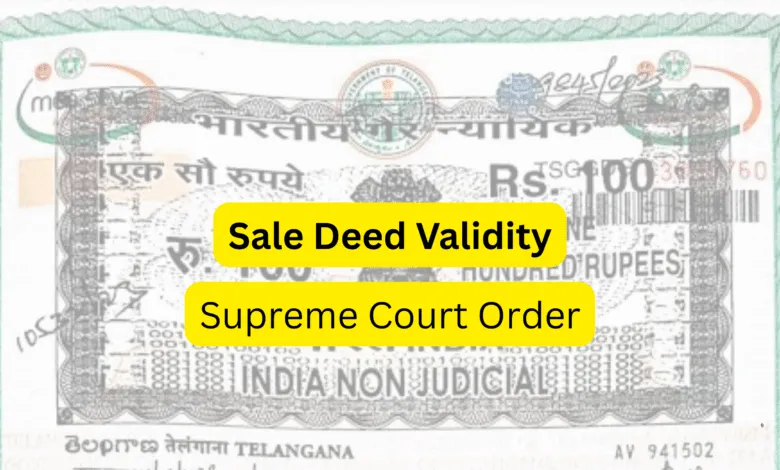Supreme Court: Unregistered Property Sale Deed Is Not Valid After 4 Months

The Supreme Court of India has given an important judgment about property sale agreements (also called sale deeds). The Court clearly said that if a sale deed is not registered within four months of signing, it is not valid according to the Registration Act of 1908. This rule is important because it protects both buyers and sellers and ensures that property deals are done legally and on time.
What Does the Law Say?
The Court explained that:
- A sale deed (agreement for selling property) is called an instrument of conveyance.
- According to Section 23 of the Registration Act, this sale deed must be registered within 4 months from the date it is signed.
- If multiple people are involved and they sign the document at different times, then as per Section 24, the 4-month deadline will be counted from the date the last person signs.
Sometimes people miss the 4-month deadline. In that case, Section 34(1) of the law allows the registration office to still accept the sale deed — but only if the delay is within another 4 months (so a maximum of 8 months total) and the party pays a fine.
What Happened in This Case?
In this particular case, the sale agreement was made in 1982, but it was registered only in 2006 — a delay of 24 years!
The Supreme Court said this is completely unacceptable. The law is very clear: registration must happen within 4 months, or within 8 months if there’s a valid reason and a fine is paid. 24 years is far beyond the allowed time.
Supreme Court Found Fraud in the Document
The Court also said that the registered sale deed was suspicious. The copy of the agreement shown as proof (Annexure P-33) was not the same as the one signed by the people involved. The Court felt this was a case of fraud and manipulation.
The bench, consisting of Justice Sudhanshu Dhulia and Justice K. Vinod Chandran, strongly criticized the actions of those who had tried to misuse the law to show an old agreement as valid.
What Happened in the Lower Courts?
Earlier, the Telangana High Court’s Division Bench had said that the agreement was valid even though it was registered many years later. They overruled a Single Judge Bench, which had correctly called it a fake transaction.
But the Supreme Court disagreed with the Division Bench and restored the decision of the Single Judge. The Supreme Court said the High Court was wrong to accept such a delayed and invalid registration.
What Was the Main Legal Question?
The Supreme Court was asked:
Can an old property agreement that was never registered be used later to claim ownership of land or to prevent someone from being removed from that land?
The person who supported the old sale deed said that it was “validated” in 2006 by an official. But the opposing side (the State of Telangana and other landowners) said that this was illegal, because the document was not registered within the required time.
What Laws Did the Supreme Court Use?
The Court looked at three important rules from the Registration Act, 1908:
- Section 17: If you sell, lease, or gift property, it must be registered.
- Section 23: You must register it within 4 months of signing.
- Section 34(1) Proviso: If you’re late, you can get only 4 more months, and must pay a fine — making 8 months the maximum.
Final Decision of the Supreme Court
The Supreme Court clearly said:
“Whether the agreement is the original from 1982 or the one validated in 2006 — both are not valid. Registering it so many years later does not make it legal.”
This ruling shows that property agreements must be registered on time. Otherwise, they are not valid in the eyes of the law. You cannot use an old, unregistered agreement to claim land or stop eviction.
Importance of this Case
This judgment is important for anyone buying or selling property in India. It is a reminder that:
- Property sale deeds must be registered within 4 months.
- A delay beyond 8 months is not allowed, except in rare cases with valid reasons.
- Old agreements that were never registered cannot be used later to claim ownership.
This helps to prevent fraud, fake claims, and protects genuine landowners and buyers.
